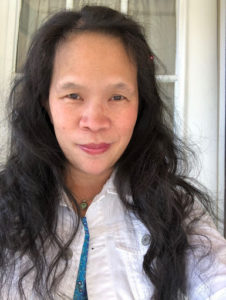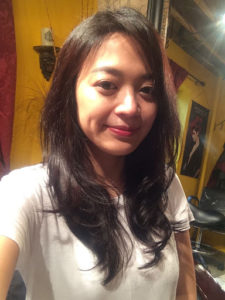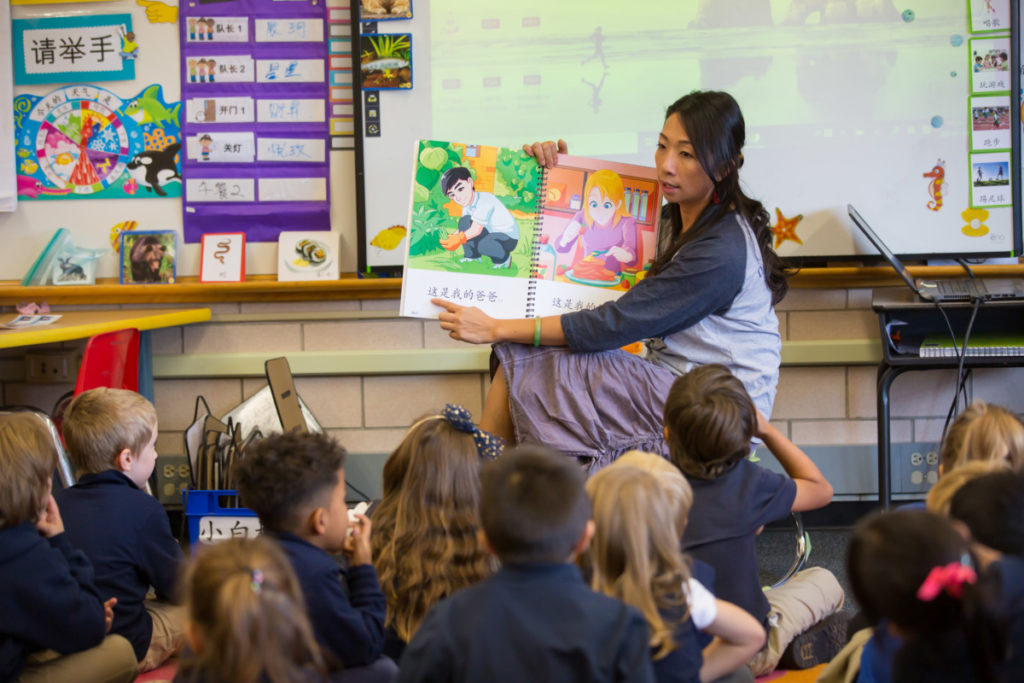Denver Language School is a K-8 language immersion public charter school offering Spanish or Mandarin, and serving almost 900 students from the Denver metro area. A group of six DLS parents who are native speakers of either Spanish or Mandarin came together to create Target Language Storytime. The project provides reading videos for the DLS community that promote early literacy in the target languages and help provide resources to families who may not speak the language at home.
Three of the parents from the project wrote about why language immersion education is important to their families.
Lily Chang
 Lily Chang was born and raised in Knoxville, Tennessee, and currently lives in the Denver metro area with her four children. Besides teaching philosophy and writing fiction, she loves spending time with the kiddos, playing with the family’s cats, taking photographs, and drinking coffee.
Lily Chang was born and raised in Knoxville, Tennessee, and currently lives in the Denver metro area with her four children. Besides teaching philosophy and writing fiction, she loves spending time with the kiddos, playing with the family’s cats, taking photographs, and drinking coffee.
“As a second generation American, I didn’t fully appreciate the merits and benefits of being bilingual, in English as well as Mandarin, until my adult life, when fuller language acquisition had become much more of a challenge. My colloquial Chinese is passable, because I grew up in a trilingual home, where Taiwanese, Mandarin, and English were spoken, and also because my sister and I went to Chinese school for one day a week, three hours at a time, in our formative years. But, due to my poor attitude growing up and lack of discipline, I am, by and large, illiterate in Mandarin. It wasn’t until my adult years that I became more interested and diligent in learning Mandarin, by participating in a summer language study program in Taiwan and doing a foreign study term in China. Even with that, my Mandarin, by my standards, is still pretty shabby.
As a kid who was born and raised in the Southeastern part of the US, where the minority made up for less than one percent of the population, I badly wanted just to fit in. I already stood out by appearance: having darker hair and darker skin and being shorter. I didn’t want language to be yet another barrier, another way people would make fun of me for being different. However, in hindsight, I regret the choices I had made, because I could have learned so much more, had my attitude been different.
Fast forward to the present, I have four kiddos. Though they are biracial, I want them to remember and participate in their Taiwanese heritage. And speaking Mandarin, eating Taiwanese food, and learning about culture are just some important parts of that.
Let us rewind and go back a bit in time. When I first found out about Denver Language School (DLS), I had only two children, the oldest was preschool age and the younger daughter was an infant; and DLS was a relatively new school at that point. It wasn’t a private school that cost money and required tuition. I found out it is a charter school. Tuition is free. What’s more, it’s a language immersion school, in which the first three years, Kindergarten through second grade, education is taught exclusively in the target language. That meant my eldest, who would start with Kindergarten at DLS, would be taught the language, math, science, and social studies all in Mandarin, by native speakers. I was beyond excited. My children had the opportunity to be fully bilingual for free.
My children and I, along with my parents and my sister and her family, went to Taiwan in 2017, to visit a lot of extended family. My kids had no problems interacting with relatives in Taiwan and vice versa. And, overall, they had an enjoyable experience. Part of that had to do with speaking Mandarin in our home, but also, part of that was because of the language immersion education my four children had at DLS. So, language immersion education isn’t just a lovely extra to have in our family, it has been a tremendous blessing in connecting my kids with family and communities beyond where we live in Colorado.”
Patricia Lira
 Patricia Lira is originally from Veracruz México. She is an architect with a degree in child education. She moved to the USA back in 2008 to do her masters degree. She loves art, books and museums.
Patricia Lira is originally from Veracruz México. She is an architect with a degree in child education. She moved to the USA back in 2008 to do her masters degree. She loves art, books and museums.
“My dad always told me: the best inheritance I can leave you is the ability to communicate in another language. My family in Mexico always had solid foundations in matters of education and culture, which I have fostered in my only daughter. Considering that the world is evolving in a very fast way, faster than in our generations, I firmly believe that language immersion education will give her the sufficient basis to function in any area in her life. Speaking a second language opens the door to many personal opportunities.
The globalization of education, markets, and the world in general requires people to prepare much more than just a few decades ago. The command of a language other than the mother tongue has become indispensable to develop and stand out on a professional level. It has been proven that being bilingual is beneficial for people’s cognitive development, since it improves flexibility, memory and brain ability, not to mention that nowadays it is essential to learn another language since in most areas of knowledge and human development in this century other languages are used.
Well, I firmly believe that education is very important, but if it is in another language it is an exceptional gift.”
Angela Little
 Angela Little graduated from The University of Wisconsin – Stevens Point with a BA in Arts Management. She left her job in the arts field to focus on taking care of her family. She is a believer in bilingual education and the role language plays in understanding diversity, while promoting a more racially harmonious society.
Angela Little graduated from The University of Wisconsin – Stevens Point with a BA in Arts Management. She left her job in the arts field to focus on taking care of her family. She is a believer in bilingual education and the role language plays in understanding diversity, while promoting a more racially harmonious society.
“At its core, language immersion offers children the opportunity to experience the world from multiple vantage points. Learning multiple languages allows a person to conceptualize and communicate in fundamentally different ways. I believe this exposure can serve the children and society by promoting cultural understanding, acceptance, and tolerance of our neighbors.
We live in a connected world, full of vibrant and fascinating cultures. It is invaluable for children to experience differences in culture, while recognizing differing social constructs do not change our value as humans. Language immersion is a strong first step in normalizing, and ultimately celebrating our differences.
Immersion education gives children the opportunity to communicate with people that (to them) are otherwise unreachable. By establishing common ground through language, relationships can bloom, and understanding can prevail where discord and mistrust have taken hold. Regardless of the target language, children learn every single day that ‘different’ is not ‘wrong.’ Immersion students will see the world through more than one lens, and can apply this beautiful, dimensional, and sophisticated way of thinking to everything in their lives.
Immersion education can help develop an agile mind, capable of perspective that traditional education does not provide. I believe Immersion education demonstrates there is always more than one way to accomplish, or communicate something. This leads to balanced thought patterns, informed by different perspectives. I can also attest, learning foreign languages early in the formative years of education makes the goal of becoming multilingual much more realistic.
Despite these benefits, Immersion can be a tough sell. This isn’t the way our grandparents learned. In America, language Immersion profoundly diverges from traditional methods. It is a system that is often misunderstood, and at times unfairly classified. It is a progressive system that requires commitment. This is a major reason these programs need the support of parents, and school systems. We feel very fortunate to have such a fine program available to us via the Denver Public Schools, and proudly support Denver Language School.”




